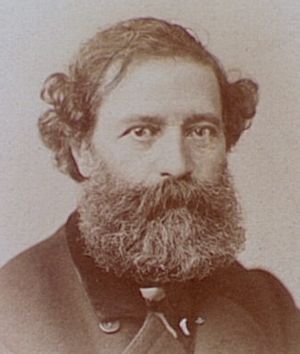Félix Pyat facts for kids
Félix Pyat (born October 4, 1810 – died August 3, 1889) was a French journalist, writer, and politician. He was known for his socialist ideas and played an important role during the Paris Commune, a revolutionary government that briefly ruled Paris in 1871.
Early Life and Career
Félix Pyat was born in Vierzon, France. His father was a lawyer. After studying law in Paris, Pyat became a journalist. He was known for his strong opinions and sharp criticisms in his writings. In 1844, a pamphlet he wrote led to him spending six months in prison.
Pyat also worked as a playwright, writing many plays. He was friends with famous writer George Sand.
Politics and Exile
In 1848, a big revolution happened in France. Pyat became involved in politics. He was elected to the assembly that was creating a new government. He joined a group called "the Mountain," which supported radical changes. He even suggested getting rid of the president's job.
Pyat had disagreements with other politicians, including Proudhon. In 1849, he was involved in an attempted uprising. Because of this, he had to leave France. He lived in Switzerland, Belgium, and then England.
While in England, Pyat continued to express his strong views against the French government, especially against Emperor Napoleon III. This led to legal trouble, but he was found not guilty in an English court. In 1869, he was allowed to return to France. However, more strong statements against the authorities forced him to go back to England.
The Paris Commune
In 1870, Napoleon III was removed from power. Pyat returned to Paris. He started a newspaper called Le Combat. This paper was very critical of the government. When news came that the city of Metz might surrender to the Prussians, Pyat's paper announced it with a black border, showing his strong disapproval.
After an uprising in October 1870, he was briefly put in prison. His newspaper was later shut down, but he quickly started another one called Vengeur.
In 1871, Pyat was elected to the National Assembly of France. However, he left the assembly because he disagreed with their decision to make peace. He returned to Paris and joined the Committee of Public Safety, a leading group during the Paris Commune. He was a key figure in the Commune's decisions, including the removal of the Vendôme Column and the destruction of the home of Adolphe Thiers, a political leader.
Pyat faced criticism for some military setbacks during the Commune. He managed to escape from Paris when the Commune fell and was sentenced to death in his absence.
Later Years
In 1880, a general amnesty allowed Pyat to return to Paris safely. He was elected to the Chamber of Deputies in 1888, representing the Bouches-du-Rhône area. He sat with the far-left politicians. Félix Pyat died the following year in 1889.
See also
 In Spanish: Félix Pyat para niños
In Spanish: Félix Pyat para niños


